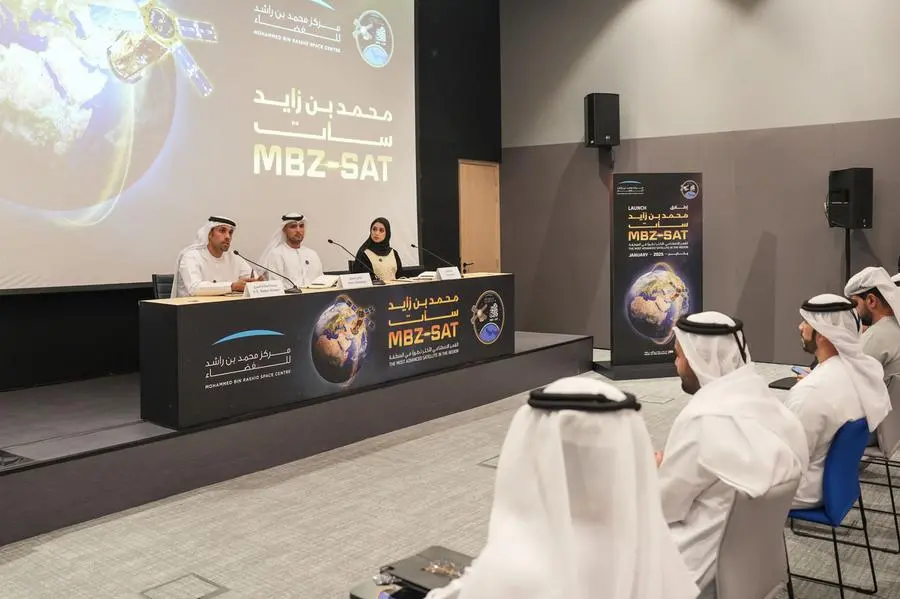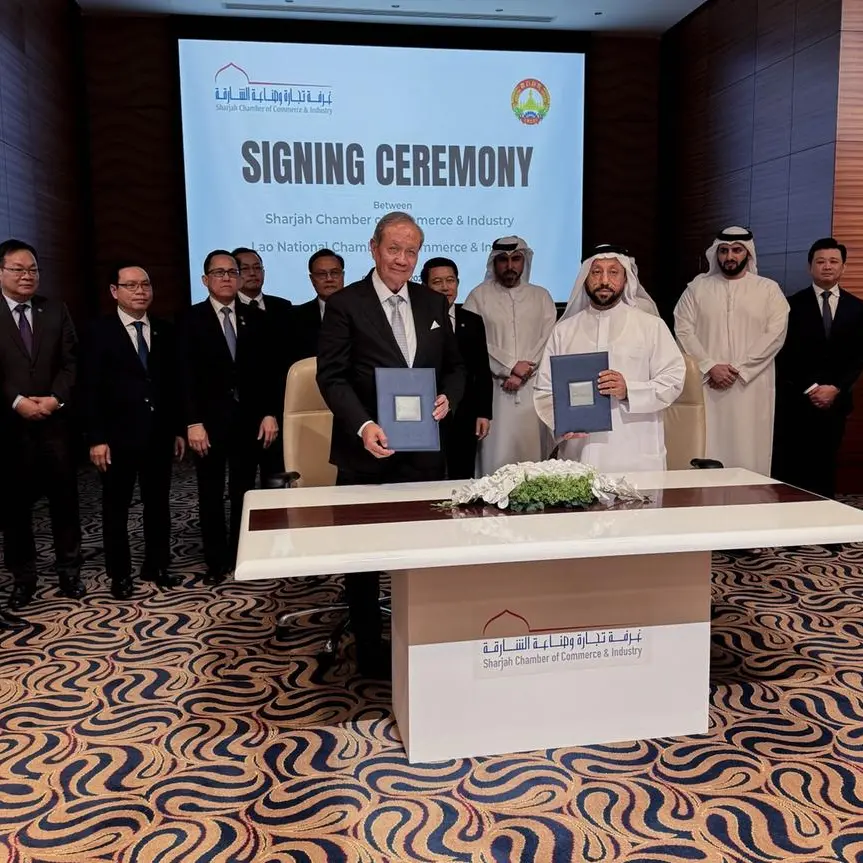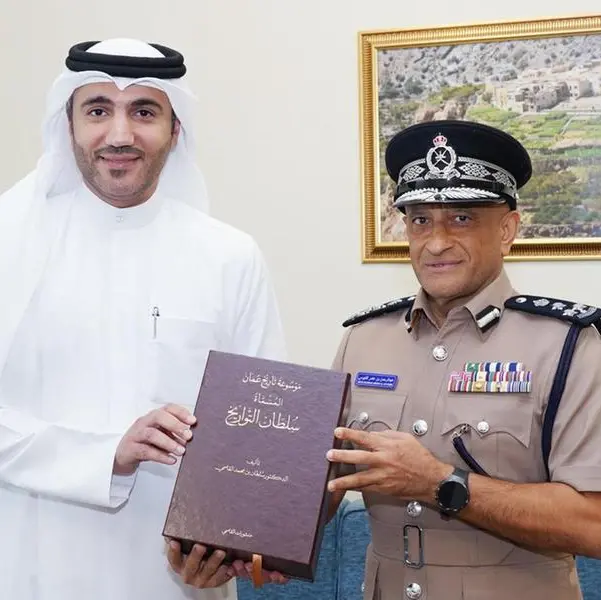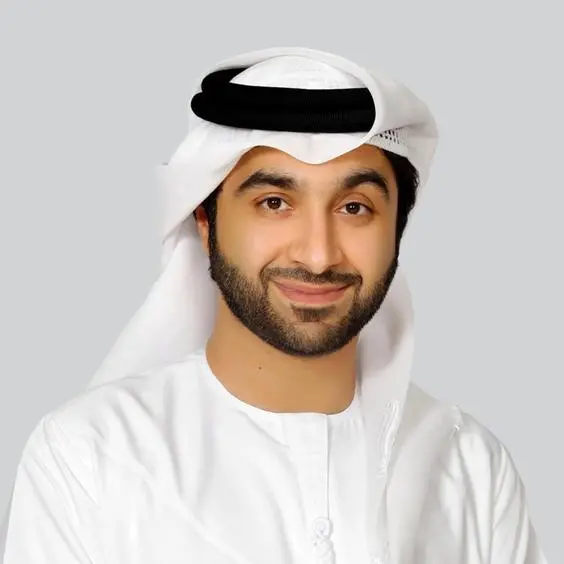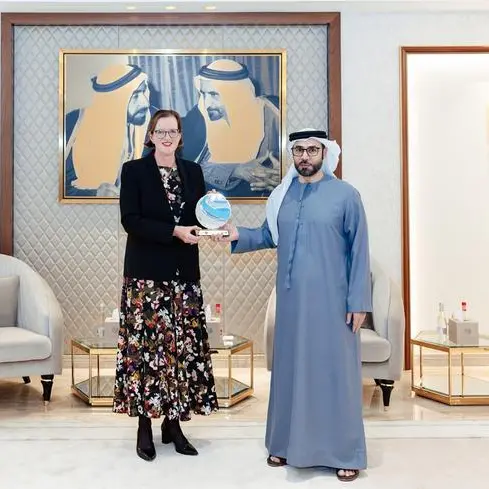PHOTO
Dubai – UAE: The Mohammed Bin Rashid Space Centre (MBRSC) today announced that final preparations are underway for the launch of MBZ-SAT, the most advanced satellite in the region. The announcement was made during a press conference attended by H.E. Salem Humaid AlMarri, Director General, Amer AlSayegh AlGhaferi, Project Manager, MBZ-SAT and Hessa Ali Hussain, Deputy Project Manager, MBZ-SAT, along with the satellite’s team at the Centre’s headquarters in Dubai.
H.H. Sheikh Mohammed bin Rashid Al Maktoum, Vice President and Prime Minister of the UAE and Ruler of Dubai had announced the project in 2020 and named the satellite in honour of H.H. Sheikh Mohamed Bin Zayed Al Nahyan, President of the UAE. The Earth-observation satellite was officially approved for launch by H.H. Sheikh Hamdan bin Mohammed bin Rashid Al Maktoum, Crown Prince of Dubai, Deputy Prime Minister, Minister of Defence, and President of MBRSC, earlier last year.
After its development in the UAE, MBZ-SAT was transported to the Korea Aerospace Research Institute (KARI) in South Korea, where comprehensive environmental testing was successfully completed. These rigorous tests, designed to ensure the satellite's resilience under the extreme conditions of space, included Thermal Vacuum (TVAC) testing, Vibration testing, Acoustic testing, and Mass Properties testing. The satellite was then transported to the launch site at the Vandenberg Space Force Base in California, USA for launch preparations.
H.E. Salem Humaid AlMarri, Director General, MBRSC said, “As we approach closer to the launch of MBZ-SAT, this project reflects the UAE’s unwavering vision for progress and innovation under our wise leadership. MBZ-SAT represents more than a technological achievement; it is a testament to our nation’s determination to lead in space science and contribute meaningfully to the global space community. Through every advancement we are empowering future generations to dream bigger and reach farther in the pursuit of excellence while harnessing the full potential of space science to benefit the nation, region and support sustainable development on Earth.”
Technology and capabilities
MBZ-SAT, fully developed by a team of Emirati engineers at MBRSC, represents a transformative step in the UAE's journey in space exploration. The state-of-the-art satellite embodies the nation's commitment to leveraging advanced space technologies to drive sustainable development and global collaboration.
The satellite, equipped with cutting-edge capabilities, sets a new standard in Earth observation. MBZ-SAT will offer image capture accuracy that is twice as precise as its predecessors and generates ten times more imagery, thanks to its automated scheduling and processing system. These images will be processed and delivered in under two hours and provide insights for applications such as environmental monitoring, disaster relief, and infrastructure management, enabling decision-makers to act swiftly and effectively.
With advanced electric propulsion, a navigation system accurate to one metre, and a star tracking system, the satellite delivers unparalleled precision in imaging locations. Its high-resolution camera and enhanced data transfer speeds—four times faster than current capabilities—solidify its position as a game-changer in the field of Earth observation.
Local partnerships
The development of MBZ-SAT has also catalysed economic growth in the UAE by fostering a robust local aerospace ecosystem. Nearly 90% of the satellite’s mechanical structures and a significant portion of its electronic modules were produced in collaboration with UAE-based companies such as Strata, EPI, Rockford Xellerix, Halcon, Falcon, and EGA. This partnership-driven approach not only enhances the UAE’s capabilities in space technology but also ensures the transfer of critical knowledge and skills to local talent, securing a competitive edge for the nation in the global space exploration journey.
Amer AlSayegh AlGhaferi, Project Manager, MBZ-SAT, “As we finalise preparations for the launch of MBZ-SAT, the satellite stands as a benchmark in technical innovation and precision engineering, spearheaded by our dedicated team from the Centre. Designed with one of the most advanced imaging systems of its kind, MBZ-SAT is engineered to deliver high-resolution data with unprecedented accuracy and speed. MBZ-SAT is a leap forward for Earth observation, promising applications that support sectors ranging from environmental monitoring to urban planning and disaster management.”
Once operational in low Earth orbit, MBZ-SAT will be managed from the Mission Control Centre at MBRSC, with teams monitoring its operations and analysing data transmitted back to Earth. The launch will mark another milestone in the UAE’s ambitious space programme, reinforcing the nation's reputation as a global leader in advanced space technologies and sustainable innovation.
-Ends-
For Media Queries:
MBRSC Media Team - mbrsc@quillmena.com
ABOUT MOHAMMED BIN RASHID SPACE CENTRE (MBSRC):
MBRSC is an advanced scientific and technological hub, responsible for making the UAE a world leader in space services and exploration.
Established in 2006, the Mohammed Bin Rashid Space Centre (MBRSC) started out with five engineers, who took it upon themselves to develop their capabilities and expand their knowledge in the field of space, relying on strong will and solid determination. Since then, the Centre has continued its journey to be the incubator of the UAE National Space Programme. The MBRSC is home to the Satellite Development Programme, UAE Astronaut Programme, Mars 2117 Programme and Emirates Mars Mission, among others. Under its satellite programme, the Centre has built, developed, and operated several Earth observation satellites, including DubaiSat-1, DubaiSat-2 and KhalifaSat, the first satellite that was fully built by Emiratis in 2018. The Centre has also developed MBZ-SAT, the most advanced satellite in the region, which will be launched in January 2025.
MBRSC is also developing the Emirates Airlock, a crew and science airlock module for the Gateway lunar space station, humanity's first international outpost to orbit the Moon. Additionally, the UAE will also be sending an Emirati astronaut on a Moon mission. Under the UAE Astronaut Programme, MBRSC currently has four astronauts, two of who have undertaken missions to the International Space Station, including the longest Arab space mission in history by H.E. Dr. Sultan Saif AlNeyadi. The Mars 2117 Programme includes the Emirates Lunar Mission, UAE Analog Programme and Space Ventures.
